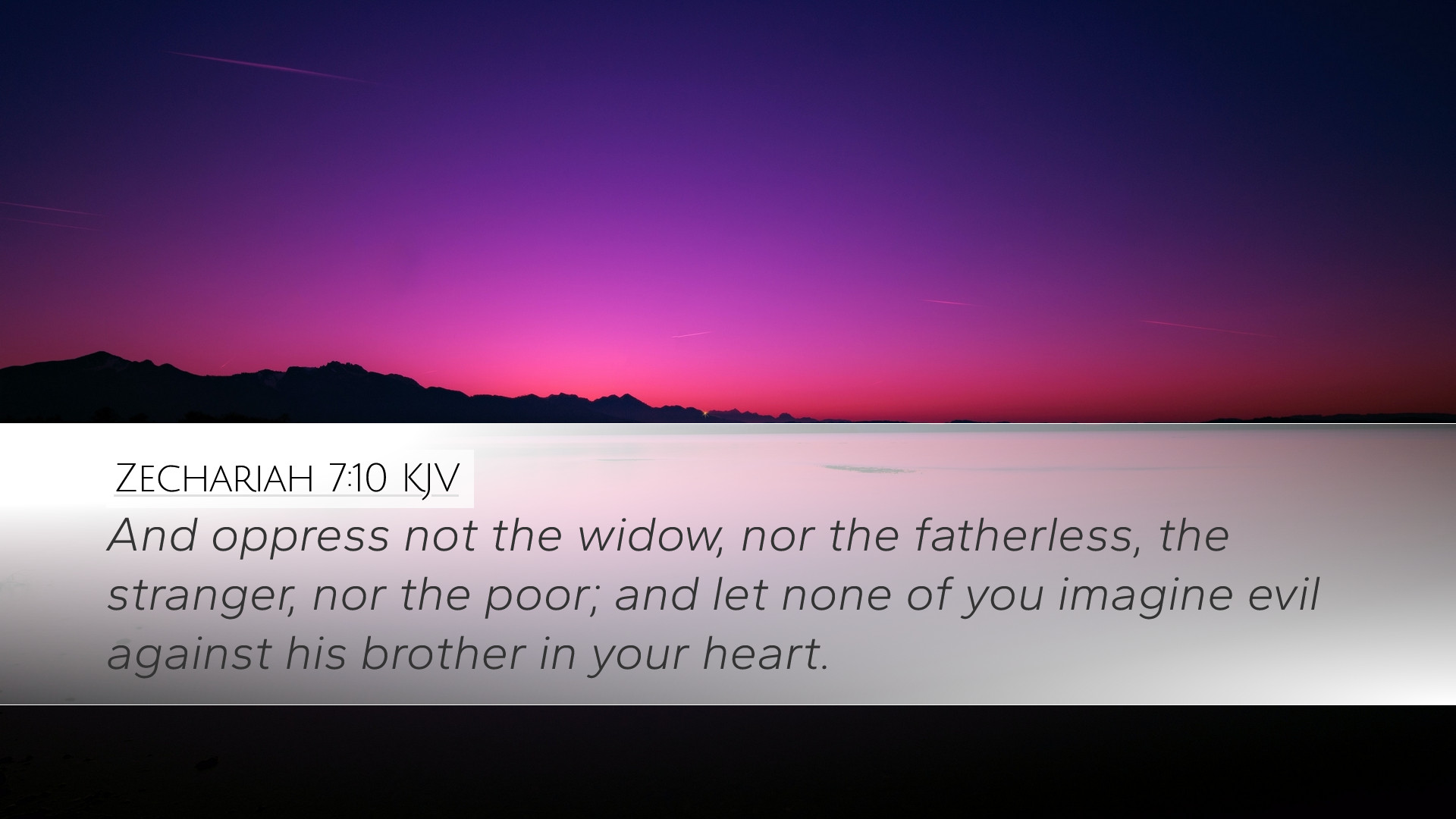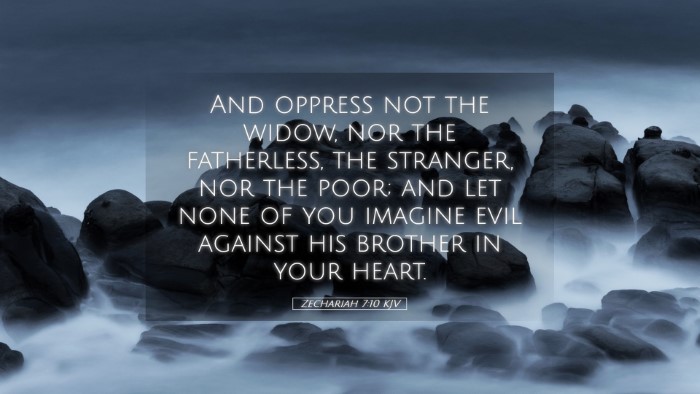Old Testament
Genesis Exodus Leviticus Numbers Deuteronomy Joshua Judges Ruth 1 Samuel 2 Samuel 1 Kings 2 Kings 1 Chronicles 2 Chronicles Ezra Nehemiah Esther Job Psalms Proverbs Ecclesiastes Song of Solomon Isaiah Jeremiah Lamentations Ezekiel Daniel Hosea Joel Amos Obadiah Jonah Micah Nahum Habakkuk Zephaniah Haggai Zechariah MalachiZechariah 7:10
Zechariah 7:10 KJV
And oppress not the widow, nor the fatherless, the stranger, nor the poor; and let none of you imagine evil against his brother in your heart.
Zechariah 7:10 Bible Commentary
Commentary on Zechariah 7:10
Bible Verse: Zechariah 7:10 - "And oppress not the widow, nor the fatherless, the stranger, nor the poor; and let none of you imagine evil against his brother in your heart."
Overview
Zechariah 7:10 serves as a poignant admonition that underscores the ethical responsibilities of God’s people towards the vulnerable in society. This command emphasizes social justice, compassion, and the inner moral state of individuals within the community of faith.
Historical Context
The prophet Zechariah delivered his messages during the post-exilic period, a time of rebuilding and reinvigoration of the Jewish identity. Following the Babylonian captivity, the Israelites faced challenges in restoring both their community and adherence to God's laws. The message in Zechariah addresses these issues, reminding the people of their covenant obligations and calling them to ethical living as an expression of their devotion to God.
Divine Commandments
The command in Zechariah 7:10 is a reiteration of the laws given earlier in the Scriptures concerning the treatment of the less fortunate:
- Widows: Their plight represents those who are vulnerable and in urgent need of support.
- Orphans: The fatherless are left without protection and guidance, making them especially susceptible to exploitation.
- Strangers: These signify not only literal foreigners but also those who are marginalized or excluded from the social fabric.
- The Poor: The destitute are depicted as objects of compassion, deserving of aid and support.
Notably, the verse not only instructs against oppression but also warns against harboring malice in one’s heart, highlighting the internal moral conviction necessary for genuine compliance with these commands.
Commentary Insights
Matthew Henry: In his typical expository style, Henry stresses the moral imperative of kindness and justice inherent in this verse. He elaborates that the neglect of these responsibilities could lead to societal collapse and divine displeasure. Henry emphasizes that a heart free of malice is as vital as the tangible actions of benevolence.
Albert Barnes: Barnes provides thorough exposition on the implications of "imagining evil against" one's brother. He interprets this as a call to maintain purity in thought, thereby reflecting the righteousness of God. He notes that the avoidance of ill will is foundational to community harmony and spiritual integrity.
Adam Clarke: Clarke draws attention to both the social justice aspect and the spiritual condition of those who oppress or harbor ill will. He posits that true faith leads to righteous actions and attitudes, encouraging a communal ethos of mutual support and love. Clarke draws parallels to Christ’s teachings in the New Testament, showing the continuous thread of caring for the vulnerable.
Theological Implications
The verse calls Christians to reflect the character of God, who is depicted throughout Scripture as a protector and champion of the marginalized. Such ethical living is not simply beneficial for societal cohesion; it is an expression of devotion to God.
Furthermore, the call to refrain from imagining evil against one’s brother challenges contemporary believers to examine their motivations and thoughts. It invites a transformative approach that moves beyond mere action to a holistic change of heart.
Practical Applications
In today’s context, Zechariah 7:10 urges the church and individual believers to address issues of social justice actively. Here are a few practical approaches:
- Community Engagement: Work within local communities to support initiatives that aid widows, orphans, and the impoverished.
- Advocacy: Use voices to speak out against injustices faced by marginalized groups.
- Personal Accountability: Encourage individuals to examine their thoughts towards others, ensuring they align with Biblical principles of love and kindness.
- Educational Programs: Develop programs within church settings that educate congregants about social issues and how to address them biblically.
Conclusion
Zechariah 7:10 encapsulates an essential principle of spiritual and social health: the call to justice intertwined with heartfelt morality. As the church seeks to embody God's character, revisiting this command will enhance our collective witness and service, allowing us to reflect the light of Christ in a world often shrouded in darkness and injustice.


